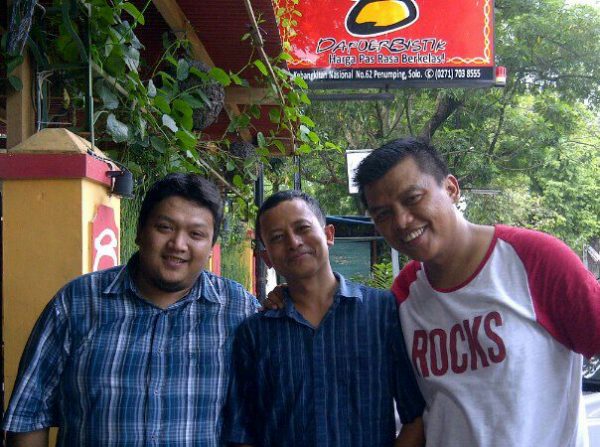The options for released ex-combatants are stark. Do they return to jihad or do they re-enter society to lead a normal life? In general, people convicted of terrorism offences are released into difficult social and economic conditions. They often lack education and find that their family does not support them. Without help, the there is a high risk that a former terrorist inmate will return to the jihadist community, where he will be protected and cared for.
My approach to this problem has been to engage directly with ex-combatants through a social enterprise initiative — a food business chain called Dapoer Bistik in Semarang and Solo, Central Java. Food can provide an excellent platform for nearly everyone to start engaging with each other. In Indonesia, food has been widely used to promote peace in the past. One example is the celebration of Padungku in Poso, where Muslims and Christians eat together to thank God during harvest time.
My first ‘client’ was Yusuf Adirima, a former Moro Islamic Liberation Front (MILF) fighter from Indonesia who was arrested in Semarang in 2003 for storing explosive materials. We first met that year when, in my former life as a journalist, I interviewed him in the Semarang Police Detention facility.
To engage people like Yusuf you must empower them. If Yusuf felt he had a reasonable control of his destiny, he would be less likely to return to radicalism. Through social and psychological engagement an individual’s commitment to and involvement in violence can be reduced to the extent that the risk of returning to violent activity will be low.
Drop-out students benefit from Dapoer Bistik too. Merely being employed is not everything for former terrorists — they need to feel they are a part of society again. So I encouraged Yusuf to start searching for drop-out students willing to work at the restaurant. This gave him a feeling that he was a useful member in the community because he was helping to solve one of Indonesia’s acute social problems: unemployment. Moreover, disenfranchised youths are always at risk of being radicalised. Now every decision Yusuf makes has a direct impact on other people’s lives. It’s harder for him to go back to clandestine activities and re-engage with his old network. Dapoer Bistik provided him with a new social network, one that gives him self-respect and dignity. Yusuf slowly became comfortable with his new life and started to invite other ex-combatants to join his new cause.
But, by themselves, individual programs like Dapoer Bistik can only have limited impact. The state needs to be involved as well. Indonesia can provide training that will help corrections officers to actively engage with the former inmates and support ex-combatants to find new callings in life. And it can get in contact with the families of former inmates, because parental and familial pressure can help steer the young men away from violence. This pressure may be overt or subtle. Parents who merely express sadness, dismay, fear or shame toward their sons can influence the choices they make in the future.
If the government is involved, it will gain more than just reassurance that the people it releases won’t return to terrorism. A former terrorist’s history and information can help provide important pieces of the mosaic of ongoing investigations — intelligence to prevent terrorist plots.
Some critics argue that governments should not directly engage former inmates convicted of terrorism offences, especially using the national budget, because the funds may be redirected for terrorism activities. There is the argument that terrorists should be locked away for life. The United States has implemented this policy, and terrorism offenders in American jails have no chance of rehabilitation. But while in Indonesia most arrested terrorism offenders will eventually be released, the existing system has insufficient funds, infrastructure and resources to their rehabilitation. This lack of post-detention care puts such inmates at risk of returning to violence because they are not being properly assessed and are receiving insufficient support to return to mainstream society.
I hope my modest work can be useful as a model that can be leveraged and tailored to fit different cultures and contexts. However, a significant amount of time and financial investment is needed, particularly for those newly convicted of terrorism offences. One person can help perhaps 10 ex-combatants at a time. But what if there was a network of capable volunteers and NGOs? Together, we would be able to reach out to many Yusufs and, through them, help many more former militants re-enter Indonesian society, so that they will not return to lives of violence. Such services would also contribute to part of the presumed role of the state. This is one way in which the Indonesian government needs to take a fresh look at its counterterrorism agenda.
Noor Huda Ismail is Founder and Executive of the Institute for International Peace Building, Jakarta.
This article appeared in the most recent edition of the East Asia Forum Quarterly, ‘Indonesia’s choices’.

